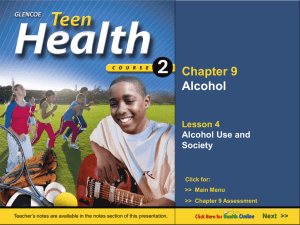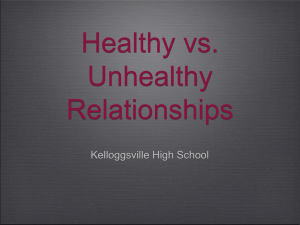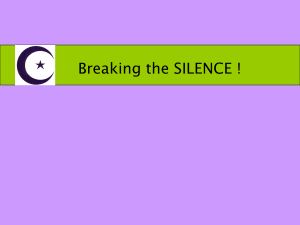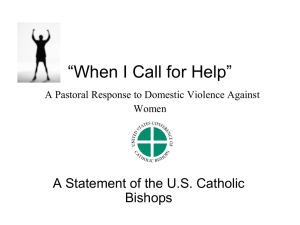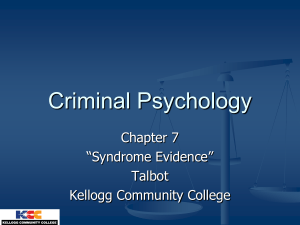SUBSTANCE-ABUSE-and-DV - Abuse Counseling & Treatment
advertisement
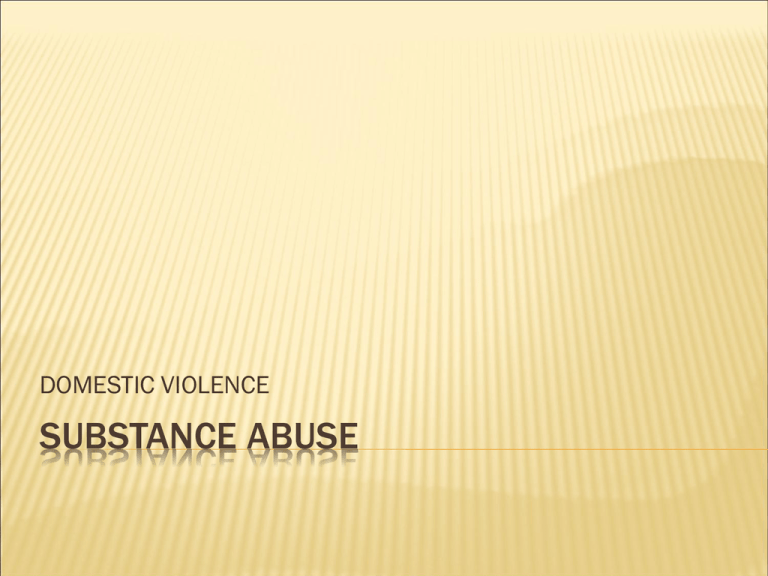
DOMESTIC VIOLENCE SUBSTANCE ABUSE STATISTICS A woman beaten in the United States every 9 seconds. (FBI statistics, 1997) One in 10 calls made to alert police to domestic violence is placed by a child in the home. 50% of homeless women and children are fleeing abuse. (Ford Foundation Study, A woman is killed in Florida due to domestic violence every 36 hours.(FDLE, Nearly 1 in 3 adult women experience at least one physical assault by an intimate partner during adulthood 1990) 1997) Battering is the single greatest cause of injury for women, causing more injuries than auto accidents, muggings, and rapes combined. (Horn, 1992) 22% - 35% of women who visit emergency rooms are there for injuries related to ongoing abuse. (American Medical Association) 40% - 50% of women killed in this country are murdered by their partners; 3% of men are killed by their partners. (FBI, 1997 DOES SUBSTANCE ABUSE CAUSE DOMESTIC VIOLENCE? SUBSTANCE ABUSE DOES NOT CAUSE BATTERING….however, a battering incident coupled with alcohol/drug abuse may be more severe and result in greater injury. Tragically, in attempting to ease the pain, a substance abusing victim may actually increase the danger she/he is exposed to: Drugs and alcohol make the victim less aware of, and less responsive to, cues of forthcoming violence Less able to escape, the victim is more likely to fight back, thus increasing the likelihood of serious injury. Battered women and substance abuse: In her book, “Compelled to Crime”, Beth Richie found that many battered women had been introduced to drugs by their abusive partner The introduction was coercive The abuse preceded the use Battered women believed using drugs enhanced safety BATTERED WOMEN USE SUBSTANCES… To cope To self-medicate To use with the batterer because she feels the violence DECREASES when he is high Many times the substance abuse has become the primary coping mechanism for the violence. For the battered women who is truly addicted…..the challenge of substance abuse recovery can only come if she is living without violence. Referral to a certified substance abuse program is critical. DOMESTIC VIOLENCE MAY BE THE CORE ISSUE…. substance abuse treatment has a much less likelihood of succeeding until the core issue is resolved. IF HE/SHE WOULD JUST STOP USING… THE LINK BETWEEN ALCOHOL/DRUG USE AND VIOLENCE OFFERS A WAY FOR HER TO UNDERSTAND HER PARTNER’S BEHAVIOR. THIS GIVES THE BATTERED WOMAN FALSE HOPE THAT IF HER PARTNER WOULD STOP USING, THE VIOLENCE WOULD END. VICTIMS OF DOMESTICE VIOLENCE FEAR FAILURE MORE THAN THE NEXT VIOLENT INCIDENT ALTHOUGH SUBSTANCE ABUSE & DOMESTIC VIOLENCE ARE RELATED, THEY ARE SEPARATE ISSUES WITH CRUCIAL DIFFERENCES. Substance abuse is primarily harmful to the USER. Domestic Violence is primarily harmful to THE PERSON BEING ABUSED. While equal numbers of men and women may be substance abusers, men are overwhelmingly the perpetrators and women are overwhelmingly the recipients of violence. While domestic violence is a criminal act, chemical dependency is criminal in ONLY SPECIFIC SITUATIONS. And yet…there has been a stronger criminal justice response to drunk driving/drug abuse than to the battering of women. CO-DEPENDENCY GROUPS Codependency groups provide comfort for some abused women. Group members are encouraged to focus on themselves, and to stop enabling or protecting their partner from the natural consequences of the substance abuse. They are encouraged to be assertive and to ask for what they want. For a woman in an abusive relationship….this can be very dangerous. If they use these newly learned strategies, the severity and frequency of the domestic violence may escalate. Abused women need to constantly assess their partner’s moods and find it necessary to cover up for them as a part of their survival strategy. What appears to be dysfunctional may be an excellent survival tactic for the abused woman. When battered women are encouraged to stop these behaviors they are in essence being asked to stop doing what may be keeping them alive. Battered women are women in crisis, women in trauma, and they will use whatever coping mechanism that successfully blocks out the pain, minimizes the danger, and helps them survive the day. Battered women who abuse substances are frequently accused of causing the battering and revictimized by those who should be helping them. LINKS BETWEEN SUBSTANCE ABUSE AND DOMESTIC VIOLENCE There are significant links between domestic violence and substance abuse: 65% - 75% of batterers frequently abused alcohol Most batterers reporting also used violence when NOT under the influence One study indicated that 18% of battered women were intoxicated at the time of their last beating. Battered women have a risk of attempting suicide 8 times greater than for non-battered women. Battered women have a risk of drug abuse 6 times greater than for non-battered women. Battered women have a rate of alcohol abuse 15 times greater than for nonbattered women. Forcing substance abusing battered women into addiction treatment programs CAN revictimize them. Twelve step programs have been uniquely successful in establishing sobriety for some substance abusers. However, the original founders of AA were men who presumably had little knowledge about the impact of violence on women. Even thought the 12-step programs have been effective for many women, survivors of domestic violence need more assistance with safety and survival issues. For those who find support and comfort in AA programs, they should be encouraged to continue. Safety planning, however, is imperative. UNDERSTANDING 12 STEPS FOR VICTIMS Any individual attempting to help an abused individual who is using drugs/ alcohol to cope should be familiar with the tenets of 12 Step Programs and understand their limitations for battered women. STEP #1 WE ADMITTED WE WERE POWERLESS OVER ALCOHOL – THAT OUR LIVES HAD BECOME UNMANAGEABLE. Battered women: I know my life is unmanageable! My partner abuses me and has power over me and my life! (This is a difficult message to overcome. It needs to be stressed that this and all other steps refer to the drug of choice, not relationships. However, in all probability, it is true that the relationship is unmanageable for you at this time.) STEP #2 CAME TO BELIEVE THAT A POWER GREATER THAN OURSELVES COULD RESTORE US TO SANITY. Battered women: I am insane. My partner was right! (Again, this refers to the bizarre behavior caused by the drug/alcohol, not that you have a diagnosable mental health disorder. However, if you are in an abusive relationship, separate from the drugs, PTSD symptoms may be present.) STEP #3 MADE A DECISION TO TURN OUR WILL AND OUR LIVES OVER TO THE CARE OF GOD AS WE UNDERSTOOD HIM. Battered women: I need to surrender again? (God, as we understand, not as anybody else. Particularly, we do not surrender to the person who does not have your best interest in mind as a primary goal.) STEP #4 MADE A SEARCHING AND FEARLESS MORAL INVENTORY OF OURSELVES. Battered women: I am stupid, worthless, no good at anything. It is my fault. (No…No…No… this is a healthy exercise for anyone….We need to be responsible for our own behavior, not others. Every person has value. STEP #5 ADMITTED TO GOD, TO OURSELVES, AND TO ANOTHER HUMAN BEING THE EXACT NATURE OF OUR WRONGS. Battered women: I guess I am wrong again. I deserved the beatings. (The sharing of this inventory is a cleansing exercise. No one deserves to be verbally, emotionally, sexually or physically abused for any reason. Others have no right to set themselves up as our judge, jury, or executioner.) STEP #6 WERE ENTIRELY READY TO HAVE GOD REMOVE ALL THESE DEFECTS OF CHARACTER. Battered women: Only my higher power can remove my defects. I am helpless, hopeless and inadequate. (We have to do our part in correcting our own behavior. God can help, but we have to choose to make changes, and get the information to make good choices and options.) STEP #7 HUMBLY ASK HIM TO REMOVE OUR SHORTCOMINGS. Battered women: Here I am begging to be a better person. If I am a better woman, will the violence stop? (Being a better person is not necessarily the point of this step. The idea is to ask for help in making healthy choices.) STEP #8 MAKE A LIST OF ALL PERSONS WE HAD HARMED, AND BECAME WILLING TO MAKE AMENDS TO THEM ALL. Battered women: I’ve nearly always been willing to apologize again and again. Maybe if I keep apologizing, my abuser will change or someone will help me. (A person is willing to make amends for harm I have done, has no assurances that others will change their behavior. There are people who care will help if you ask.) STEP #9 MAKE DIRECT AMENDS TO SUCH PEOPLE WHEREVER POSSIBLE, EXCEPT WHEN TO DO SO WOULD INJURE THEM OR OTHERS. Battered women: Others’ feelings are more important than mine and should always be put first. Maybe if I ask for forgiveness, the batterer will stop. After all, I have made some serious mistakes. (To make amends where appropriate is healthy. This does not mean we have to be submissive because another demands it. We have all made mistakes, this only proves we are human. It does not mean we deserve to be abused or punished by someone else.) STEP #10 CONTINUED TO TAKE PERSONAL INVENTORY AND WHEN WE WERE WRONG, PROMPTLY ADMITTED IT. Battered women: It has always been my fault. I keep taking responsibility and apologizing. I am so stupid. (We take honest inventory of ourselves, not allow others to do this and then tell us how we are wrong.) STEP #11 SOUGHT THROUGH PRAYER AND MEDITATION TO IMPROVE OUR CONSCIOUS CONTACT WITH GOD AS WE UNDERSTOOD HIM, PRAYING ONLY FOR KNOWLEDGE OF HIS WILL FOR US AND THE POWER TO CARRY THAT OUT. Battered women: I have already surrendered completely. I am nothing. Is this His will and plan for me? (Every person has value. However, God needs your help in fulfilling the plan. Your plan for your life is best achieved with His help, but your efforts to make good safe choices for yourself are crucial.) STEP #12 HAVING HAD A SPIRITUAL AWAKENING AS THE RESULT OF THESE STEPS, WE TRIED TO CARRY THIS MESSAGE TO ALCOHOLICS, AND TO PRACTICE THESE PRINCIPLES IN ALL OUR AFFAIRS. Battered women: Spiritual awakening? What has changed in my life? Will I have to be frightened all my life? (You cannot develop spirituality while remaining in a relationship where you are abused. Seeking professional help to end the abuse is an avenue you may want to consider.) ABUSE COUNSELING & TREATMENT, INC. (ACT) 1-800-500-1119 (239) 939-3112 24-HOUR HOTLINE SERVICES ARE FREE FOR VICTIMS OF DOMESTIC VIOLENCE AND THEIR CHILDREN AND SURVIVORS OF SEXUAL ASSAULT AND THEIR FAMILIES SUBSTANCE ABUSE AND DV I acknowledge receiving from Abuse Counseling and Treatment, Inc. Substance Abuse and DV, and I have read and understand the information set forth in the PowerPoint presentation. I understand it is my responsibility to bring questions to the Chief Executive Officer, supervisor or Community Education Coordinator if I do not understand or need clarification of any of this information. By signing this, I am verifying I have received and understand the Substance Abuse and DV. I will receive a Certificate of Training for 2 hours. Employee’s Signature: ____________________________________ Employee printed name: ______________________________ Date: __________________
